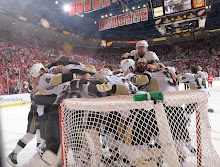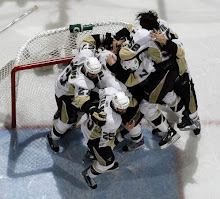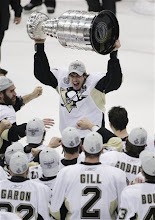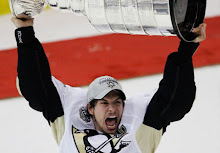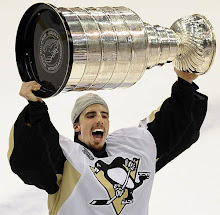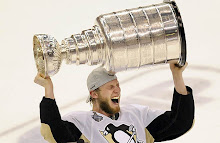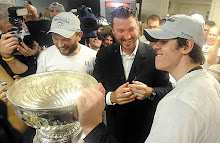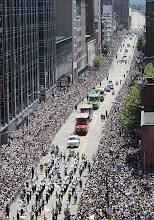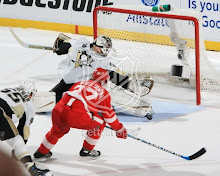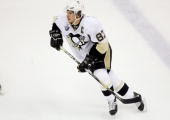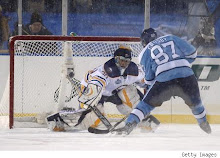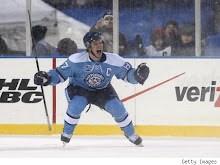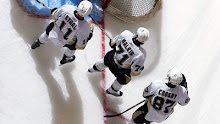Well, boys and girls, it's time to continue the debate on which Stanley Cup is the Penguins' greatest.
Last week, I wrote about the franchise's first championship, and the 1990/1991 team that brought it to Pittsburgh.
This week, it's time to break down that team's successor -- the 1991/1992 entry that won the 2nd of back-to-back titles.
That Penguins' team had mostly the same starring cast for a majority of the year. Lemieux. Francis. Stevens. Jagr. Mullen. Recchi. Coffey. Murphy. Barrasso. The difference came at the trading deadline when Jagr's continued improvement in year 2 of his career permitted then-GM Craig Patrick to change the makeup of his team significantly for a 2nd season in a row.
This time, Recchi went packing to the Flyers, Coffey went packing to the Kings, and in came rugged scorer Rick Tocchet, defensive stalwart Kjell Samuelsson and backup netminder Ken Wregget.
Tocchet immediately joined Lemieux's line and, with Kevin Stevens, helped form perhaps the NHL's most fearless line down the stretch, into the postseason and even into the following year.
Despite their offense, the Penguins actually took a step back in '91/'92, finishing 3rd in the division. Lemieux's absence for 16 games was a part of that, and the team struggled a bit to get adjusted after The Badger passed away in November of that season. Nevertheless, their 3rd place finish landed them a first round playoff matchup with the arch-rival Washington Capitals.
In what was only a prelude of matchups between these teams for years to come, the Penguins lost the first 2 games on the road and ultimatley went down 3-1 in the series. Facing elimination in game 5 and struggling to get in a groove, Lemieux and others went to then-interim coach and former Director of Scouting legend Scotty Bowman and proposed that the team implement a 1-4 delay forecheck to confuse the Capitals, stifle them offensively and perhaps create some turnovers and take advantage of them.
Their plan worked to a charm. The Capitals' were stunned and had no answer for the Penguins' new style of play. Pittsburgh rolled over Washington in the next 3 games -- including games 5 and 7 on the road -- to come back from the 3-1 deficit and take the series.
More adversity awaited for the Penguins in Round 2, where they met another one of their arch-rivals, the New York Rangers, that year's President's Trophy winner as the league's best team.
As if any series of consecutive games against the blueshirts wouldn't have been intense, the series temperature went up about 100 degrees in game 2 when forever-Penguin villian Adam Graves slashed Lemieux on the hand and broke his wrist.
That injury shelved #66 for the rest of that series and, after losing game 3 in OT, the Penguins were in a 2-1 series hole.
In game 4 at the then Civic Arena, without Lemieux and also without Mullen -- who, like #66, was injured in game 2 -- Pittsburgh faced a precarious set of circumstances. They were down 4-2 in the 3rd period and had to kill a 5-minute major penalty.
Make no mistake -- the Penguins were staring hard at going down 3 to 1 in a series for the second time in a row.
At that moment, the Penguins' entire post-season --- their entire year, essentially -- turned around thanks to one man.
Ron Francis.
Francis had already scored earlier in the game. He helped the Penguins completely shut down New York's power play, then just seconds after the power play ended, scored the goal that changed everything --- a 65 foot slapshot from outside the blueline that handcuffed and somehow eluded Rangers' netminder Mike Richter, bringing the Penguins to within a goal with about 9 minutes to go in the game.
About one minute later, Troy Loney scored to tie the game.
Then, about 90 seconds into overtime, with Pittsburgh on a power play, icon Mark Messier tried to skate out of from behind his net with the puck, only to be stripped by Murphy. Murphy spun around and put a quick shot on goal which was deflected in behind the stunned Richter replacement -- John Vanbiesbrouck -- for the hat trick by Francis, finishing off one of the most memorable games in franchise history.
Highlights of that game can be enjoyed here:
http://www.youtube.com/watch?v=RkBetCrJTZw
I'll never forget that contest, because I was there in person to see it. Sure, I was up in the rafters sitting in obstructed view seating, but I can tell you that even though I was nearly farther from the ice than anyone in the buliding, I sure celebrated after the win like the players on it.
With such a big momentum swing, the Penguins went on to eliminate the Rangers by winning the next 2 games -- a close one in New York and a blowout back in Pittsburgh in game 6 -- setting themselves up for a conference final series against the Boston Bruins for the 2nd straight season.
Unlike in the 1990/1991 year, however, the Bruins were no match for Pittsburgh this time. Even without Lemieux for most of the series, the Penguins' capitalized on all the mojo their series' win over the Rangers gave them and romped over Boston in a 4-game sweep to send them to the Stanley Cup Finals for the 2nd straight season.
In 1991/1992, they matched up against a team from the then-Norris Division, although this time it wasn't the Minnesota North Stars. It was the Chicago Blackhawks -- a team that had won a then-NHL record 11 straight playoff games coming into the finals. They hadn't lost in more than a month, dating back to early in round 1 and came riding high on the heels of Jeremy Roenick, Chris Chelios and Ed Belfour.
With the Penguins' having won 7 straight of their own, that series shaped up as a clash of the titans.
Or so everyone thought.
Game 1 set the tone for that series and, for the first half of the game, the Penguins actually did themselves worse than they did in game 4 against New York at the Civic Arena.
This time they were down 3 goals, not 2, looking at a 4-1 deficit. Not to be deterred, however, the Penguins stormed back in the latter part of the 2nd period, ignited by Jaromir Jagr, who scored a goal by singlehandedly stickhandling around 3 blackhawk players to the slot from the near boards -- including one of the better defensive players in the league at the time, Brent Sutter, who Jagr left on the parkway headed to the airport -- before backhanding a shot past Belfour.
Ah, the memories:
http://www.youtube.com/watch?v=_6u1f1F5xAU
While that goal by Jagr helped the Penguins get back in the game and was one of the best goals ever scored at the old Igloo, he was topped by perhaps the only player in the game with a greater flair for the dramatic.
Mario Lemieux.
After Tocchet rallied the Penguins to a 4-4 tie with a goal with 5 minutes to play in the 3rd, it looked like overtime was looming. Even a power play the Penguins were awarded with about 11 seconds left in the game wouldn't have seemed to give them a chance to win until the extra frame.
So much for that theory. As almost every Penguin fan knows, words don't do justice to describe what happened next. Just watch:
http://www.youtube.com/watch?v=P9STr-jICqQ
In my 26 years of following hockey, I don't know that I've ever seen the Igloo get that loud. I honestly thought the roof was going to blow off. Simply incredible.
The best part is that Lemieux's goal there came off a set play that worked -- but barely. It was premised off a clean faceoff win and a shot on goal by Murphy. In that situation, Lemieux was going to go to the net and look for a rebound. But Francis didn't win the draw cleanly. And in the second or two it took for him to get the puck back to #55, Lemieux hesitated going to the net. Even Murphy hesitated as Francis tried to get the puck back to him. But #10 did, Murphy pinched a stride or two -- just enough to get a low shot off designed for a rebound -- and Lemieux went for gold at just the right moment.
If there's a play that should be freeze framed, that was it. I can only wonder what Belfour was thinking as he realized he kicked the puck right out to Lemieux's blade with only seconds to play and a gaping hole in the net to his right.
How about, "Oh F----"????
Ha.
You know, if Francis and Murhpy lose that puck, a Blackhawks' player -- I think it was Steve Larmer -- would have gone the other way on a clean breakaway. Let's face it. Lemieux was cheating a little looking for the chance to end it and, while Larmer blew it because he, too, shouldn't have been cheating and instead should have stuck with #66, the fact is that the play could have disasterously gone against Pittsburgh the other way.
Again, another momentum stealer for Pittsburgh. Of course, we all know they swept through the rest of the Final after that, including a 6-5 win and a 1-0 win, on the way to their own 11 straight playoff victories and 2nd straight Stanley Cup, culminated by Mike Lange's greatest call of all time:
"Oh Lord Stanley, Lord Stanley .... Get Me The Brandy"
Little did I know that game 4 of the Rangers series -- that one I attended -- would be the Penguins' first of 11 straight. To think they didn't lose another game the rest of the postseason. It still amazes me.
The Penguins' had quite a run that year. They again faced adversity -- although more in the form of individual game deficits (4-2 against NY in game 4; 4-1 against Chicago in game 1) and injuries (Lemieux, Mullen) than series adversity.
But the Penguins' 2nd championship has to be defined for its overall dominance more than anything else. Those 11 consecutive playoff wins still stands as an NHL record and no other team has done that since. Moreover, I don't expect any other team to do that again anytime soon. That's like just about sweeping 3 rounds in a row. With the parity that exists in today's game, you just aren't going to see that.
In considering which title is better, you can't argue with the demonstrated dominance that defined the Penguins' 2nd championship team.
Like the first Cup run the year prior, the 1991/1992 team also faced a 7-game series (and not one but two short ones, as already mentioned). And while scoring in bunches was again their trademark, they had the same degree of character and grit they had the prior year. In both seasons, the Penguins put out a well-balanced club.
In my final installment -- I'll weave in this past year's Stanley Cup championship into the equation. I won't break it down like I did the first two because the title from this past season is fresh in everyone's mind. Instead, I'll make comparisons between all 3 and, in the end, offer my opinion on which of the three is the franchise's greatest.
Until then ....
Thursday, August 20, 2009
Wednesday, August 12, 2009
Let The Debate Begin: Which Championship Is The Penguins' Greatest? Installment I
As promised, it's time to begin the debate on which of the Pittsburgh Penguins' three Stanley Cup Championships is the greatest.
Some will view all 3 titles as equally great. Others will not. Certainly, each run was different for the Penguins, with different players, different moments, and different degrees of difficulty. And that's what makes this analysis admittedly subjective. Each person is going to examine the question in a way another person will not.
Personally, I believe one title stands above the others, and once I have reviewed all 3 Cup runs separately -- which I will do over the next several weeks -- I'll reveal which championship I believe is the Penguins' best and indicate why.
In the meantime, I have posted a poll to the right which gives you a chance to vote on which title you think was the greatest. I'll leave the poll posted for a while, so please weigh in and let me know what you think. Do it now, or wait until I have posted on all 3 championships and then decide.
So, without further adieu, let's review the Pittsburgh Penguins' 1990/1991 Stanley Cup Championship run and team:
The 1990/1991 season was the first and only full season Bob Johnson coached the Penguins before being diagnosed with -- and succuming to -- brain cancer early the following season.
While losing Johnson was a tragic blow for the franchise, all it took "The Badger" was a single year to leave an indelible impact on the Pittsburgh Penguins for decades to come, as evidenced by the franchise's first Stanley Cup Championship at the end of that season, and by the fact that, even today, the Penguins' rely on Johnson's famous "It's a Great Day For Hockey" phrase in promotions with the current group of flightless birds.
The Penguins were generally regarded as on the rise throughout hockey circles beginning in the late 1980's when Mario Lemieux led them back to the post-season for the first time since he was drafted in 1984. That was in the 1988/89 season and, while the Penguins missed the post-season the following year, they bounced back in the '90/'91 season after the trade deadline splash that landed them my favorite player of all time -- Ron Francis -- and Ulf Samuelsson and returned the post-season on the heels of the team's first Patrick Division championship.
In round 1, the Penguins faced off against a Patrick nemesis, the New Jersey Devils, and they didn't have an easy time of it. After battling the Devils even in the first four games, the Penguins lost game 5 at home and faced elimination on the road in game 6. Worse, starting star goaltender Tom Barrasso came up with back spasms at that point in the series and had to give the crease over to backup netminder Frank Pietrangelo.
What did Pietrangelo do? Only make one of the greatest stops in NHL history in game 6, robbing New Jersey star Petr Stastny with a reachback glove effort that is known in Pittsburgh only as "The Save". For those who can't ever get enough of watching that save, click here:
http://www.youtube.com/watch?v=wAh5PTg_Qr4
That save virtually took the steam right out of New Jersey. The Penguins won that game 4-3, then returned home and finished off the Devils with a 4-0 shutout -- again with Pietrangelo in goal -- to send New Jersey packing and set up a 2nd round set against the Washington Capitals.
Unlike many of the Penguins' series against the Caps' in ensuing years, this one was not a 7-gamer, nor one where the Penguins had to come back from a 2-0 or 3-1 series deficit. After dropping the first game of the Patrick finals to Washington that year, the Penguins won in overtime in game 2 when Kevin Stevens finished off a 2-on-1 by taking a Francis pass and beating Caps' netminder Mike Liut. Again, highlights anyone?? :
http://www.youtube.com/watch?v=Bgcsy9zyeYE
Watching that clip was a great reminder of how Caps' defenseman Al Iafrate was no Paul Coffey. Iafrate basically tried to mimick what Pens' D-man Coffey did just seconds before and rush the puck all the way up the ice. Fortunately for Pittsburgh, Iafrate turned over the puck and that led to the 2-on-1 that Stevens finished.
Washington never recovered after that. They dropped the next 2 games at home and the Penguins finished them off in game 5 back at Mellon to set up a Conference Final against the Boston Bruins.
It's hard to forget the Bruins' series, because the Penguins dropped the first two games on the road -- including game 2 on an overtime goal by Bruins' forward Vladimir Ruczicka -- and were staring hard at a quick elimination at Boston's hands.
In the locker room after game 2, Stevens boldly and unambiguously declared that the Penguins would come back and win the series. Stevens' Penguin teammates obviously rallied around that cry because they then won the next 4 games and rolled the Bruins right out of the postseason in dominating fashion in the process, outscoring Boston in those games 20-7.
The Penguins' series win against the Bruins' propelled them to their first Stanley Cup Final, against the Campbell Conference Champion Minnesota North Stars.
While I don't think many NHL observers at the time necessarily expected a Pittsburgh/Minnesota final, the teams played a fairly good series -- especially for the first 4 games. And it's hard to say what was more notable about the series looking back.
Obviously, the Penguins' first Stanley Cup championship stands out high on the list of franchise moments, but there probably isn't a hockey fan alive that hasn't seen or doesn't know about Mario Lemieux's heart-stopping goal in game 2, where he went 1-on-2 on a rush into the Minnesota zone, split North Stars' defenseman Mark Tinordi and Shawn Chambers -- leaving Chambers in a heap on the ice in his wake -- before deking Minnesota netminder Jon Casey out of his pants and deposing a backhand into the vacated cage all while falling down to the ice.
Watch this for a deserving encore:
http://www.youtube.com/watch?v=pEdgiPEDa8w
Despite that effort by Lemieux in game 2, the North Stars took a 2-1 series lead after winning game 3 and, going into game 4 in their building, talk started to surface that Minnesota was planning their Cup parade.
When word about that got out, the North Stars didn't win another game.
In games 4, 5 and 6, the Penguins opened up the offense and put 19 goals behind a beleaguered Casey, blitzkrieging the North Stars defense for multiple quick-strike goals in each of those games, culminating in a 8-0 whitewashing of Minnesota in the Cup-clinching game 6 where even the likes of defenseman Jim Paek and Ulf Samuelsson got into the goal-scoring act.
Lemieux was a deserving Conn Smythe winner that season, too. It was his first crack at Lord Stanley and everyone knows that he wasn't going to let it slip away after getting that close.
I'll never forget the Penguins winning that Cup -- their first.
I was 18 at the time and had been a fan for only 8 years up to that point, dating back to 1983, but I took to hockey quickly and greatly, and was very passionate about it. It was such a great moment for me as a fan.
I should have gone out to the airport to greet them as they came back to town, but my girlfriend at the time was busy with me that night, so ..... While that wasn't a bad alternative, in hindight, I should have partied with all the other fans at Pittsburgh International instead.
ANYWAY ....
The Penguins really blossomed in the 1990/1991 season as an offensive force. They had Lemieux, Francis and Stevens leading the way offensively, and had capable then-support players in Mark Recchi and Joe Mullen. Of course, Coffey and Larry Murphy patrolled the backline and Barrasso tended goal.
In addition, that Penguins team had grit and sandpaper to match their skill. Troy Loney, Bob Errey, Phil Bourque filled those roles up front and Samuelsson paced the backline in that department.
In short, the Penguins were well-balanced. As I said, they came into their own that year, and that obviously continued into the next season.
Looking at the entire run, the Penguins faced several key doses of adversity (game 6 against the Devils; going down 2-0 against Boston), won a 7-game series, had the all-important short series in round 2, and just took things over when it mattered most in the final. They didn't have to go through the toughest of competition record-wise or rankings-wise (save for their underdog, comeback victory over the Bruins in the Conference Finals, which may have been their most impressive accomplishment during the run), but give them credit for taking advantage of that. That's what good teams do.
Next time, I'll review the Penguins' 2nd Stanley Cup championship team and playoff run -- the one from 1991/1992 that capped back-to-back titles for the birds.
Wednesday, August 5, 2009
Penguins Hire Tony Granato As Assistant Coach
So much for waiting 2-3 weeks.
Earlier this morning, when I posted about the hiring of John Hynes to assist Todd Reiden in Wilkes-Barre, I suggested that the Penguins would probably hire their assistant coach in that time period.
Later today, they surprised me and many others in the hockey world by not bringing a true up-and-comer in the coaching ranks, but a former NHL head and assistant coach.
Tony Granto joins the Penguins organ-I-zation with 6 years of coaching experience with the Colorado Avalanche, dating back to the 2002-2003 season. He served 2 stints as head coach with that organization and several as an assistant. Overall, his record there as a bench boss was 215-104-17-16.
I have mixed feelings about bringing Granato on board. Forgetting about my surprise over going for a coaching 'veteran' (relatively speaking) for a moment, I think Granato might, at least, be an nice complement to Blysma. He's someone that HCDB can call on for experience when needed and who can relate to the players like Disco Dan can. Those are good qualities and, in that sense, he's not very different than Tom Fitzergald, who served behind the bench so well as an assistant during this last season's Cup run before going back into the front office.
What concerns me about Granato is that he's never been regarded as a good coaching prospect in league circles. It's fair to say that it was a shock when the Avalanche put him behind their bench for the first time about 6 seasons ago. Personally, I think his record at the time was more of a reflection on the talent Colorado had then, rather than anything he did. They had more high end talent coming off their 2001 Stanley Cup than the Penguins did this past season.
As everyone knows, that's right about the time things started to deteriorate in the Rocky Mountain state and now, the Avalanche are one of the worst teams in the league. Granato was clearly not able to prop them up and keep them afloat. I'm not solely blaming him for their struggles the last 4 or so seasons, but I don't know of any feeling league-wide that he contributed greatly to that franchise. Obviously, had he done so, he would still be behind their bench.
In fact, Granato was really a lame duck in Colorado this past season, in his second stint behind the bench. Everyone knew he was just a stopgap measure until Colorado could hire a permanent coach and, once again, he didn't do a whole lot for the Avalanche in the standings.
In short, I'm just not certain he's cut out to be a good coach in the NHL. He may serve the Penguins' well as an assistant, for the reasons set forth above, but beyond that, I don't view Granato as a bright young coaching mind that it would be nice to have on the staff next to HCDB.
Interesting hiring. One I have mixed feelings about for sure. But I'm willing to give Granato a chance here and see how he does. He's coming into a very stable situation, so that may help him. If he can play the complementary role better than he plays the lead, the Penguins could be benefit. Time will tell.
Penguins Add To Coaching Stable; Lose Pesonen
Yesterday, Pittsburgh Penguins' GM Ray Shero announced that one of the 2 assistant coaching vacancies within the organization had been filled.
Not at the NHL level next to HCDB (Head Coach Dan Bylsma), but instead at the minor league AHL level assisting Todd Rierden.
34-year old John Hynes signed on to the organization after six years leading the USA Hockey National Development Program. That team was 216-113-19-9 during that time and captured 3 World Under-18 medals. Hynes also coached the Under-17 team this past year, and managed several appearances on the staff of the U.S. World Junior Championship team dating back to 2004, including the one that one the gold medal that year.
By all accounts, Hynes is a bright coaching talent with a proven knack for developing young players. In that regard, while there is sure to be an adjustment to coaching at the pro level, there's no reason to think he won't serve the Baby Penguins well.
I imagine that sometime in the next 2-3 weeks, Shero will announce who will get the assistant job at the big-league level -- a decision that Bylsma is sure to have a lot of input on. Shero has shown the propensity to select and groom several young coaching an executive prospects in his 3 years of running the Penguins, so I'm anxious to see who he brings into the organization next.
Meanwhile, word surfaced that Janne Pesonen signed with the Kontinental Hockey League (KHL) for the coming season, leaving the organization that brought him over after dominating the Finnish Elite League, but only let him play -- and sparingly, at that -- in 7 NHL games last season.
Pesonen dominated at the AHL level, setting a Baby Penguins' franchise record for points in a season with 82, but in this writer's opinion, never got a fair shake in Pittsburgh. He wasn't a favorite of former coach Michel Therrein it seems, and the grass was no greener when Bylsma -- the guy who coached him most of the season at Wilkes Barre - took over.
And that was perhaps the most telling circumstance at all.
Pesonen obviously has talent, but he certainly wouldn't be the only player to either dominate in Europe or at the AHL level, but not be able to do the same against the best players in the world in the NHL. And it's probably especially harder for smaller players -- like Pesonen -- to do.
Bringing in Pesonen last year was, I felt at the time, an exciting move by Shero. It clearly was a low-risk/high-reward type signing. Unfortunatley, it didn't work out for Pesonen and the team. Wilkes Barre will be worse off without him, but the big club certainly won't miss him.
As I mentioned last week, I will soon be putting up a series of posts which breaks down the question of which of the Penguins' three (3) Stanley Cup Championships is the franchise's greatest. I hoped to do that this week -- and still may, later in the week, but if not, then next week for sure. Personally, I look forward to devouring this issue.
More then.
Not at the NHL level next to HCDB (Head Coach Dan Bylsma), but instead at the minor league AHL level assisting Todd Rierden.
34-year old John Hynes signed on to the organization after six years leading the USA Hockey National Development Program. That team was 216-113-19-9 during that time and captured 3 World Under-18 medals. Hynes also coached the Under-17 team this past year, and managed several appearances on the staff of the U.S. World Junior Championship team dating back to 2004, including the one that one the gold medal that year.
By all accounts, Hynes is a bright coaching talent with a proven knack for developing young players. In that regard, while there is sure to be an adjustment to coaching at the pro level, there's no reason to think he won't serve the Baby Penguins well.
I imagine that sometime in the next 2-3 weeks, Shero will announce who will get the assistant job at the big-league level -- a decision that Bylsma is sure to have a lot of input on. Shero has shown the propensity to select and groom several young coaching an executive prospects in his 3 years of running the Penguins, so I'm anxious to see who he brings into the organization next.
Meanwhile, word surfaced that Janne Pesonen signed with the Kontinental Hockey League (KHL) for the coming season, leaving the organization that brought him over after dominating the Finnish Elite League, but only let him play -- and sparingly, at that -- in 7 NHL games last season.
Pesonen dominated at the AHL level, setting a Baby Penguins' franchise record for points in a season with 82, but in this writer's opinion, never got a fair shake in Pittsburgh. He wasn't a favorite of former coach Michel Therrein it seems, and the grass was no greener when Bylsma -- the guy who coached him most of the season at Wilkes Barre - took over.
And that was perhaps the most telling circumstance at all.
Pesonen obviously has talent, but he certainly wouldn't be the only player to either dominate in Europe or at the AHL level, but not be able to do the same against the best players in the world in the NHL. And it's probably especially harder for smaller players -- like Pesonen -- to do.
Bringing in Pesonen last year was, I felt at the time, an exciting move by Shero. It clearly was a low-risk/high-reward type signing. Unfortunatley, it didn't work out for Pesonen and the team. Wilkes Barre will be worse off without him, but the big club certainly won't miss him.
As I mentioned last week, I will soon be putting up a series of posts which breaks down the question of which of the Penguins' three (3) Stanley Cup Championships is the franchise's greatest. I hoped to do that this week -- and still may, later in the week, but if not, then next week for sure. Personally, I look forward to devouring this issue.
More then.
Monday, August 3, 2009
Penguins Sign G Curry; Other News and Notes
On Saturday, the Penguins signed restricted free agent netminer John Curry to a two year, 2-way contract that will pay him 500K in the NHL, and significantly less while at Wilkes-Barre.
Curry will compete with veteran Brent Johnson -- signed about 2 weeks ago -- for the backup position behind incumbent starter Marc-Andre Fleury.
It was mostly a foregone conclusion that Curry would re-sign with Pittsburgh. While he was strong at the AHL level last year with the baby Penguins, going 33-15-1 with a 2.36 GAA and .918 SV%, and went 2-1 with the big club, he doesn't have enough recognition league-wide to be a threat to sign elsewhere.
There won't be many training camp battles to watch starting in mid-September. The one Johnson and Curry will wage is one of them.
Expect Johnson to beat out the young guy and keep him manning the #1 job in Wilkes Barre this coming season.
In other Penguins news, the club also signed minor league forwards Wade Brookbank and Wyatt Smith to one-year, two-way contracts. Both are expected to be in Wilkes Barre most of the season.
Brookbank is a 6' 4" physical winger who scored once in 27 games with Carolina last year. He has 127 NHL games under his belt, and was a part of the Baby Penguins back in 2006-07.
Smith had 47 points in 71 AHL games in San Antoino last season. A 5' 11" center, Smith has 211 quiet NHL games on his resume.
Meanwhile, from the rumor mill, I've heard reports that the Penguins are talking with the agent for still-unsigned LW Alex Tanguay, formerly of the Montreal Canadiens.
Put another way, the agent for Tanguay has initiated dialogue with Pittsburgh about his client.
Tanguay had 19 goals and 51 points last year in limited action and, after missing the main boat of contract signings once free agency began on August 1, is still looking for a club to call home for the coming year.
While he's not known as a gritty player, Tanguay is somewhat intriguing as a scoring winger for Pittsburgh. The problem is that the Penguins' salary cap situation makes it hard for them to have an overwhelming interest in Tanguay.
On the other hand, I've heard reports that Tanguay's best offer to-date may not be much more than 1 million, and if that's the case, Tanguay certainly could do a lot worse than signing for similar money to play in Pittsburgh on a one-year deal with Sidney Crosby or Evgeni Malkin and get a lot more interest in his services league-wide next season.
Time will tell if this goes anywhere, but I don't have high expectations.
Finally, I can't help but address the comments made about the Penguins late last week from Flyers Vice-President Bobby Clarke.
Clarke, wining in the press again for gosh knows what reason this time, complained about how the Flyers have always tried to win and not gotten rewarded for it, and contrasted his club with the local team from Pittsburgh, who he said lost "seven years in a row so they could get good" and "did it twice, in fact"."
Clarke went on to call it "embarassing" that 3 of last season's final 4 teams -- Pittsburgh, Washington and Chicago -- have "missed the playoffs for six or seven years in a row."
First of all, Clarke is obviously bitter because the Penguins have 3 Stanley Cups in the last 18 seasons while his sad-sack franchise has gone without a championship going on a whopping 35 years.
Beyond that, the man can't add. The Penguins only missed the playoffs 4 seasons in a row this decade, rather than 7.
Moreover, back when the Penguins won their first 2 titles, a majority of their teams at the time were not the result of being so bad for so long. Sure, Mario Lemieux was drafted 1st overall because Pittsburgh was the laughingstock of the National Hockey League in 1993, and Jaromir Jagr was also picked high in the 1990 draft, but it's worth pointing out that Jagr was selected one choice AFTER the Flyers' genius braintrust decided to choose character player Mike Ricci instead of the guy that ended up being one of the greatest scorers in the game's history.
Beyond that, if you look at almost every other key contributor from those championship teams, those players were acquired by trade -- Tom Barasso, Ron Francis, Paul Coffey, Joe Mullen, etc. Even Kevin Stevens and Mark Recchi, other key contributors of the team who actually were drafted by the Penguins, were not picked highly.
It's a shame Clarke is so wrong about the Penguins. If he weren't, he might have an excuse for not being able to help build his own team into a winner all these years. As it is, he continues to be a part of the leadership brass in that organization that believes it can win championships with subpar goaltending.
If I were a Flyer fan, and I'd witnessed the likes of Roman Cechmanek, Brian Boucher, Sean Burke, Robert Esche, Martin Brion, Antero Nittymaki, and now Ray Emery man the pipes the last decade, I would have disowned the team.
(Actually, if I were a Flyer fan, I'd kill myself, but .....)
In all honesty, Clarke is probably the only executive league-wide who feels it is "embarassing" that probably the 3 most exciting and offensively-gifted teams in the game led the charge for the NHL in this last year's post-season. That's why the NHL got some of the best TV ratings in decades during the playoffs. But no --- that's bad for the game.
Clarke needs to stop knocking the draft system the league has in place, stop whining and moaning about the Penguins' success, and stop doing such a bad job at getting his own house in order in Philadelphia.
He's pathetic.
Just one man's opinion.
Curry will compete with veteran Brent Johnson -- signed about 2 weeks ago -- for the backup position behind incumbent starter Marc-Andre Fleury.
It was mostly a foregone conclusion that Curry would re-sign with Pittsburgh. While he was strong at the AHL level last year with the baby Penguins, going 33-15-1 with a 2.36 GAA and .918 SV%, and went 2-1 with the big club, he doesn't have enough recognition league-wide to be a threat to sign elsewhere.
There won't be many training camp battles to watch starting in mid-September. The one Johnson and Curry will wage is one of them.
Expect Johnson to beat out the young guy and keep him manning the #1 job in Wilkes Barre this coming season.
In other Penguins news, the club also signed minor league forwards Wade Brookbank and Wyatt Smith to one-year, two-way contracts. Both are expected to be in Wilkes Barre most of the season.
Brookbank is a 6' 4" physical winger who scored once in 27 games with Carolina last year. He has 127 NHL games under his belt, and was a part of the Baby Penguins back in 2006-07.
Smith had 47 points in 71 AHL games in San Antoino last season. A 5' 11" center, Smith has 211 quiet NHL games on his resume.
Meanwhile, from the rumor mill, I've heard reports that the Penguins are talking with the agent for still-unsigned LW Alex Tanguay, formerly of the Montreal Canadiens.
Put another way, the agent for Tanguay has initiated dialogue with Pittsburgh about his client.
Tanguay had 19 goals and 51 points last year in limited action and, after missing the main boat of contract signings once free agency began on August 1, is still looking for a club to call home for the coming year.
While he's not known as a gritty player, Tanguay is somewhat intriguing as a scoring winger for Pittsburgh. The problem is that the Penguins' salary cap situation makes it hard for them to have an overwhelming interest in Tanguay.
On the other hand, I've heard reports that Tanguay's best offer to-date may not be much more than 1 million, and if that's the case, Tanguay certainly could do a lot worse than signing for similar money to play in Pittsburgh on a one-year deal with Sidney Crosby or Evgeni Malkin and get a lot more interest in his services league-wide next season.
Time will tell if this goes anywhere, but I don't have high expectations.
Finally, I can't help but address the comments made about the Penguins late last week from Flyers Vice-President Bobby Clarke.
Clarke, wining in the press again for gosh knows what reason this time, complained about how the Flyers have always tried to win and not gotten rewarded for it, and contrasted his club with the local team from Pittsburgh, who he said lost "seven years in a row so they could get good" and "did it twice, in fact"."
Clarke went on to call it "embarassing" that 3 of last season's final 4 teams -- Pittsburgh, Washington and Chicago -- have "missed the playoffs for six or seven years in a row."
First of all, Clarke is obviously bitter because the Penguins have 3 Stanley Cups in the last 18 seasons while his sad-sack franchise has gone without a championship going on a whopping 35 years.
Beyond that, the man can't add. The Penguins only missed the playoffs 4 seasons in a row this decade, rather than 7.
Moreover, back when the Penguins won their first 2 titles, a majority of their teams at the time were not the result of being so bad for so long. Sure, Mario Lemieux was drafted 1st overall because Pittsburgh was the laughingstock of the National Hockey League in 1993, and Jaromir Jagr was also picked high in the 1990 draft, but it's worth pointing out that Jagr was selected one choice AFTER the Flyers' genius braintrust decided to choose character player Mike Ricci instead of the guy that ended up being one of the greatest scorers in the game's history.
Beyond that, if you look at almost every other key contributor from those championship teams, those players were acquired by trade -- Tom Barasso, Ron Francis, Paul Coffey, Joe Mullen, etc. Even Kevin Stevens and Mark Recchi, other key contributors of the team who actually were drafted by the Penguins, were not picked highly.
It's a shame Clarke is so wrong about the Penguins. If he weren't, he might have an excuse for not being able to help build his own team into a winner all these years. As it is, he continues to be a part of the leadership brass in that organization that believes it can win championships with subpar goaltending.
If I were a Flyer fan, and I'd witnessed the likes of Roman Cechmanek, Brian Boucher, Sean Burke, Robert Esche, Martin Brion, Antero Nittymaki, and now Ray Emery man the pipes the last decade, I would have disowned the team.
(Actually, if I were a Flyer fan, I'd kill myself, but .....)
In all honesty, Clarke is probably the only executive league-wide who feels it is "embarassing" that probably the 3 most exciting and offensively-gifted teams in the game led the charge for the NHL in this last year's post-season. That's why the NHL got some of the best TV ratings in decades during the playoffs. But no --- that's bad for the game.
Clarke needs to stop knocking the draft system the league has in place, stop whining and moaning about the Penguins' success, and stop doing such a bad job at getting his own house in order in Philadelphia.
He's pathetic.
Just one man's opinion.
Subscribe to:
Posts (Atom)






